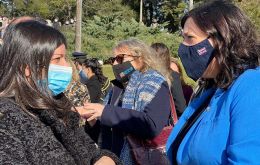MercoPress. South Atlantic News Agency
Tag: Guido Manini Rios
-
Friday, May 5th 2023 - 14:38 UTC
Uruguay: President Lacalle Pou demands resignation of Housing Minister Moreira over “direct award” scandal

Uruguay is experiencing a crisis in the government cabinet formed by a coalition of conservative parties. President Luis Lacalle Pou requested the resignation of Housing Minister Irene Moreira after a controversial direct awarding of a house to a militant of her party, Cabildo Abierto, without a lottery, as reported by Montevideo media on Friday.
-
Friday, March 31st 2023 - 15:36 UTC
54% of Uruguayans reject social security reform

The Uruguayan government has passed a social security reform bill in the Senate. However, objections from the Cabildo Abierto party, a partner of the ruling coalition, have generated uncertainty about its implementation.
-
Friday, August 27th 2021 - 08:15 UTC
Argentina and Uruguay ladies love and celebrate the Falklands

Ladies support for the Falkland Islands in the River Plate is expanding. As happened just a few weeks ago in Buenos Aires when two historians, one of them with an international reputation, acknowledged the Falklands belong to the Falkland Islanders and doubt Argentina's claim, in Uruguay a member from a ruling coalition junior party last 14 August twitted the hashtag “HappyFalklandsDay”.
-
Thursday, October 1st 2020 - 12:31 UTC
Uruguayan lawmaker, ex Commander-in-Chief, avoids the lifting of immunity due to accord in ruling coalition

It is ten o'clock in the morning and the Senate of Uruguay has several hours of intense debate ahead of it. Only few minutes before midnight, the ruling coalition of parties will have put the lid on the criminal investigation against their partner and current leader of the Cabildo Abierto, investigated for the alleged omission of denouncing the confessions of crimes against humanity made by a former military man before a Court of Honor in 2018.
-
Monday, November 25th 2019 - 09:59 UTC
Uruguay's presidential runoff results delayed because of the very tight results

Uruguay Sunday's presidential runoff results have been so tight that the Electoral Court will only make a definitive announcement sometime late this week after it has completed counting all votes, including some 34.000, classified as “observed”. This is because the difference between the two candidates is some 29.000 votes.
-
Saturday, November 23rd 2019 - 09:59 UTC
Uruguay Sunday's presidential runoff, a multicolor power switching with strong winds of change

This Sunday 2.7 million Uruguayans will cast their ballots in the presidential runoff, which according to all opinion poll forecasts, will have Luis Lacalle Pou, the leader of an opposition multicolor alliance as head of the Executive next March, but equally significant, power switching, it will mark the end of fifteen years of almost undisputed predominance of a catch-all coalition, Broad Front, which ruled South America's smallest country for three consecutive five-year mandates.
-
Monday, October 28th 2019 - 09:58 UTC
Winds of change in Uruguay: ruling coalition stumbles, next government will be “multicolor”

Winds of change have swept in Uruguay. After fifteen years in office, and enjoying an absolute legislative majority, the Broad Front could lose control of the Executive on 24 November, when a runoff is scheduled among the two most voted candidates this Sunday.
-
Saturday, October 26th 2019 - 09:59 UTC
Uruguay votes on Sunday with a strong forecast change in the air

Uruguayans head to the polls on Sunday to elect a new president, 30 senators and 99 Lower House members. If none of the eleven presidential candidates manages 50% of cast votes plus one on 27 October, a runoff between the two hopefuls with most support is scheduled for 24 November.
-
Tuesday, October 8th 2019 - 09:56 UTC
Uruguayan election: “a ponies race, no thoroughbreds competing”

On Sunday 27 October the Uruguayan electorate will be voting for a new president (there is no immediate reelection) and a renewed Legislative, 30 Senators and 99 Lower House members. Uruguay is one of the more stable countries in the region, both it's solid institutions as well as its citizens who are deeply committed to democracy, social rights and a strong presence of government in the economy.
-
Friday, September 6th 2019 - 09:55 UTC
Uruguay farmers gathered in Montevideo to protest against the government: clashes with the police

Horses, tractors and hundreds of rural producers from all over the country gathered in front of the Uruguay Parliament on Thursday to denounce the problems that the agricultural sector is experiencing and criticize the government for not listening to the proposals of the Un Solo Uruguay (One Uruguay) movement. The political, non-partisan movement brings together producers and actors of the rural environment and the interior of the country.
